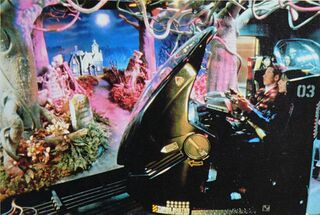Difference between revisions of "Ghost Hunters"
From Sega Retro
m (fixed typo, reword) |
(fixed links, updated ref) |
||
| Line 13: | Line 13: | ||
}} | }} | ||
| − | {{stub}}'''''{{PAGENAME}}''''' (ゴーストハンターズ) (subtitled ''Labyrinth of Poisonous Moth'' in Japan) is a 3-minute long attraction designed by [[Sega]] for its amusement theme park venues in the mid-1990s. Combining the traditional [[ | + | {{stub}}'''''{{PAGENAME}}''''' (ゴーストハンターズ) (subtitled ''Labyrinth of Poisonous Moth'' in Japan) is a 3-minute long attraction designed by [[Sega]] for its amusement theme park venues in the mid-1990s. Combining the traditional [[wikipedia:Dark ride|dark ride]] attraction with elements of [[wikipedia:Augmented reality|augmented reality]], the high-end attraction was primarily operated at [[Joypolis]] locations. |
==Story== | ==Story== | ||
| Line 36: | Line 36: | ||
* [[Sega World Sydney]] | * [[Sega World Sydney]] | ||
| − | The only unit to remaing operating is the former [[Sega World Sydney]] model, purchased by Indian resort [ | + | The only unit to remaing operating is the former [[Sega World Sydney]] model, purchased by Indian resort [https://www.haailand.in/ Haiiland] after the Sega venue’s closure.{{ref|https://www.haailand.in/pages/rides.html}} |
==Promotional material== | ==Promotional material== | ||
Revision as of 20:40, 22 March 2021

| |||||
| Ghost Hunters | |||||
|---|---|---|---|---|---|
| System(s): Medium-scale attraction | |||||
| Publisher: Sega | |||||
| Developer: Sega AM5 | |||||
| Number of players: 32 | |||||
|
This short article is in need of work. You can help Sega Retro by adding to it.
Ghost Hunters (ゴーストハンターズ) (subtitled Labyrinth of Poisonous Moth in Japan) is a 3-minute long attraction designed by Sega for its amusement theme park venues in the mid-1990s. Combining the traditional dark ride attraction with elements of augmented reality, the high-end attraction was primarily operated at Joypolis locations.
Story
Players are volunteer "Ghost Hunters" at the Institute for Spirit Extermination. Director Harold and his assistant Jennifer welcome the players for routine training, when an emergency suddenly occurs: the Arthur family's home on 7th Avenue is overrun with ghosts. Players mount one of sixteen "Turbo Buster" ride vehicles, which are equipped with a special spiritual barrier and autopilot, and use their "blaster beams" to rid the house of its ghost infestation.
Gameplay
Ghost Hunters consists of sixteen two-seater ride vehicles which automatically travel on a track through an elaborate haunted house environment. On the front of each vehicle are two light guns and a large, concave perspex shield which acts as both a windshield and a mirror. As each car manoeuvres around the track, CGI ghosts and light gun effects are projected onto the perspex screen and also onto various parts of the ride's scenery to create augmented reality illusions.
Each player is tasked with using their lightgun to shoot the ghosts as quickly as possible, while traveling through spooky scenes which are a mixture of digital and practical effects -- including "breathing" walls and overhead air cannons which blow down onto unsuspecting riders. The amount and type of ghosts change depending on the players' performance. The "final boss" of the ride is a moth-like creature named Gorgon. If Gorgon is defeated, a photo is snapped of the player who dealt the final blow and printed on a mock newspaper article, which is given to the "hero" as a souvenir.[1] Each ride cycle carries players around the circuit twice.
History
Locations
Ghost Hunters made its public debut at Osaka ATC Galbo, and was subsequently installed at various Sega amusement parks.
- Yokohama Joypolis
- Ichikawa Galbo
- Yokkaichi Galbo
- Niigata Joypolis
- Fukuoka Joypolis
- SegaWorld London
- Shinjuku Joypolis
- Sega World Sydney
The only unit to remaing operating is the former Sega World Sydney model, purchased by Indian resort Haiiland after the Sega venue’s closure.[2]
Promotional material
Artwork
References
- ↑ http://www.sega.co.jp/sega/atp/atc/ghost.html (Wayback Machine: 1997-06-19 11:04)
- ↑ https://www.haailand.in/pages/rides.html

